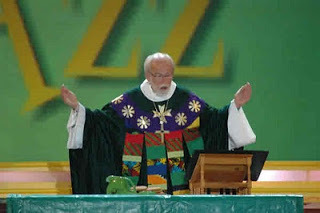Dwight Longenecker's Blog, page 363
March 6, 2011
Relevant and Relative

Whenever I meet another convert to the Catholic faith from Anglicanism. I listen as they express extreme dismay and disappointment at the liturgical wasteland that is the American Catholic Church. He criticized the celebrant's game show style--all chatty and 'relevant' and full of jokes. He loathed most priest's lame attempts to make the words of the liturgy 'meaningful.' The Lord be with YOU! with a huge smile and almost a hug. Next under fire was the sentimental, saccharine music with the heretical lyrics, and the rec room atmosphere of the church--all soft lights and carpet and comfort. Why no cup holders in the pews?
"Why oh why" he lamented "is the Catholic Church in America so awful?"
I think it comes down to this: the historical and liturgical development of the Anglican and Catholic Churches, since the Reformation has been very different. The Anglicans got used to liturgy in the vernacular and they eventually had their own 'reform of the reform' in which they learned to celebrate the liturgy with beauty, reverence and care while using the vernacular.
Catholics, in the meantime, continued to use Latin. Then when the floodgates opened at the second Vatican Council the Catholics (many of whom felt that the Latin was totally inaccessible and arcane) went whole hog on making the liturgy 'understandable' 'relevant' and 'accessible'. Everything from the old days was considered to be inaccessible, elevated, cut off from the people and all the old traditions and customs were deemed out of touch, out of date and so out the window.
I honestly believe that many Catholics had no idea what most of the stuff they had in church and did in church meant. This includes the priests and bishops. I don't think they understood the rich history of vestments and architecture and liturgy and incense and sacred music and sacred art and candles and bells and crucifixes and confession and pilgrimages and processions and relics and saints days and the whole vast treasure house of Catholic tradition.
Nobody had explained it to them, and nobody had explained it because nobody could. Nobody could remember what all that ornate clobber was for. Everybody had forgotten about reverence and solemnity and beauty and dignity and they even forgot what worship was for in the first place. They were just going through the motions.
None of it made sense to them. They didn't know what they were doing or why. Consequently, they were longing for something more relevant, more real and more connected with the people's lives. The good ones wanted the Lord to touch people. They wanted the people to know the faith and love the faith and to know and love the Lord. So they listened to the Protestant-minded progressives and saw all the traditions and customs as burdens and blockages so they chucked the whole lot. They were like people in an art gallery who don't understand medieval paintings and so put them out for the garbage man and replace them with Andy Warhol and Roy Lichtenstein--who are of course, 'much more accessible.'
In swept the liturgical reforms and everything became 'relevant'. I can understand what people wanted. They wanted the liturgy to relate to ordinary people and connect. That's a laudable intention. The problem is, that when liturgy is relevant it is also relative. When you change the liturgy in an attempt to relate to a particular culture, a particular people, in a particular time and place you end up making the liturgy not only relevant, but relative. What you do might be fashionable and 'cool' but it soon goes out of date. You know the old saw, "He who marries the fashion of the age will soon be a widower."
So we now go into the flying saucer churches with big sound systems and carpet on the floor polyester vestments, abstract artwork and an architecture that was clever or cool in the seventies and it all looks as hopelessly out of date as refrigerators in harvest gold or avocado green, bell bottoms, tie dyed T shirts and Scoobydoo cartoons. Then we see the people who are doing music "that will attract the young" but the only people who like it are old. We see priests and religious trying hard to "be relevant" and they are as embarrassing as Uncle Mack with his comb over, suntan, open neck shirt and gold jewelry.
The Anglicans (at least some of them) understood, in the meantime, that the liturgy was timeless and that it should be celebrated thus. Of course I'm aware that I'm painting with broad strokes. There are plenty of Anglicans who were just as wacky and 'relevant' as the Catholics. You only have to check out Madame Schori and her gang to confirm that one. Likewise there were Catholics who saw what was happening and tried to stem the tide.
Last thing is this: how do you change it? A better liturgy will change some things, but what really needs to happen is for there to be a fundamental change in what people believe about the faith. We must see the faith as timeless and at once irrelevant in whatever age or culture it finds itself and at the same time the most relevant and necessary thing for the people of any age to hear.
Those who want to make the church 'relevant' should realize that the faith, when it is radically lived out will always be both "relevant" and "irrelevant" at the same time. It will be relevant if it is radical and critical of the age in which it exists. In other words, it will be relevant exactly at the point that it seems to be irrelevant and 'out of touch.'
Likewise, and just as paradoxically, when Christians try to make the church 'relevant' that is when it is least relevant, for that is when it has lost it's chutzpah--in trying to please the children of this age--it will lose all its salt and all its oomph.
And if a dish has lost its salt and a church has lost it's oomph it's lost everything. It's lukewarm and the Lord says he will spit it out.
Published on March 06, 2011 09:16
Slubgrip Exhorts
 Hinge. I've come across your type before. Snobbish little devil called Bracket. I expect you went to training college together over at Stygian Hall. That's where you developed your fine taste in brimstone, started filing your horns, getting that embossed filigree on your wings, and what's this? A black silk cape with a red lining? And your initials monogrammed in red silk? Where are you going... the opera? I can see you've had your beard trimmed as well--got rid of the goatee and are cultivating the well trimmed look are we? Don't you think that's a bit, well, Mefistofelean?
Hinge. I've come across your type before. Snobbish little devil called Bracket. I expect you went to training college together over at Stygian Hall. That's where you developed your fine taste in brimstone, started filing your horns, getting that embossed filigree on your wings, and what's this? A black silk cape with a red lining? And your initials monogrammed in red silk? Where are you going... the opera? I can see you've had your beard trimmed as well--got rid of the goatee and are cultivating the well trimmed look are we? Don't you think that's a bit, well, Mefistofelean? Forget all your vanities Hinge. Don't you know that dreary season of Lent is coming up? It's bad enough that you allow your patient to read that nauseating blog of 'Father' Longenecker's but have you realized that your patient is thinking of purchasing Fr Longenecker's infantile and revolting expose called The Gargoyle Code?
The priest who writes tacky little articles like 'The Cheerful Exorcist' keeps bouncing through life with a jaunty air about him which makes me sick. He's a thoroughly proud and arrogant priest who always affects an air of self deprecating humor and mock humility. He makes me want to vomit my lava.
Your patient must not read that book Hinge. It's designed to be read during Lent, and to reveal to the patient all our most clever tricks and subterfuges. Attack Hinge. Do everything you can to prevent your patient laying hands on the book. Put him under a haze. Put him under a shadow. Entrance him. Entrap him. Keep him anesthetized and dozy.
And keep him away from that Gargoyle Code piece of propaganda.
Published on March 06, 2011 08:32
March 4, 2011
Why Being Right is Wrong
 There is a line in a poem by e.e.cummings which sticks with me: "Even on a Sunday may I be wrong, for whenever men are right they are not young."
There is a line in a poem by e.e.cummings which sticks with me: "Even on a Sunday may I be wrong, for whenever men are right they are not young."Of course I am not disputing the necessity of believing the right thing and behaving the right way. What I am wary of is the human foible of (having pursued what is right) believing that we have arrived and we are right. How much self righteousness, pride and broken relationships result in believing we are right. How much humility, humor and good relationships can be built when we honestly believe that we are wrong--or if not wrong, then not completely right.
Can you persist in an argument with anyone if you stop for a moment and question your own position? Can you persist in an argument once you've stopped to see it from their point of view? Don't arguments fade away once you take the blame? What if you really are right? Stop for a moment. You may be right, but they are right too in some way or there would not be an argument. When you stop to say, "I'm wrong!" or at least, "I could be wrong!" The heart of the argument fades.
Think how often you've stirred things up because you think the other person is 'just wrong!" But what if you stopped and looked at it from their perspective? What if you gave the other person the benefit of the doubt? What if you imagined for a moment in your selfish pride that you were actually wrong and they were right? What if, you couldn't do that but you were at least able to grant that they had a point that should be considered? What if you stopped to listen really listen?
Forget about arguments, and think for a moment how much more you would learn about life if you were wrong and not right all the time. Think what new curiosity you would be given, what a young and positive and inquisitive spirit you would have if you knew your ignorance rather than knowing how much you know. Think how much you would discover if you knew what you don't know rather than being so sure of what you know.
Think for a moment of how little humor and fun there is in being right. Have you ever met a "righteous" person who has a sense of humor? I once spoke to a Jehovah's Witness who was ever so 'right' and told him the main reason I could never follow his religion is because I never saw him smile. How many righteous religious people do you know who are so grim and glum in their being right? Too many I fear. Why is that? Because all the best humor is based on a misunderstanding, a fault, a problem and a failure. We laugh when "righteousness" and false dignity are undermined. It is far funnier when the pompous mayor has a pie in the face or when the pompous prelate slips on the banana skin.
I often wonder how I ever got to be a priest since I so often feel I am not very religious--at least in that 'I'm religious and have got all the answers kind of way." I become irritated at the religious people therefore who use their religion as a way to re-inforce their prejudices and support their comfort zone. Too many use religion to close down enquiry and close down the adventure of faith and take refuge in 'being right', and the next step from that closing down of the human heart and mind is to blame others who have opened up.
The sick kind of religious mentality must construct not only a comfort zone, but eventually a fortress, for the comfort zone is never comfortable and safe enough, and once they construct the fortress they are still not safe enough inside, so they must soon find an enemy on the outside, and if there is no clear enemy they soon create one.
This is the aspect of religion which drives me wild with anger and fear. Their obsession with "being right" has made them use religion for exactly the opposite purpose of God's intention. Religion was meant to be a trampoline. They've turned it into an easy chair. It was supposed to launch them into life and they've used it to lock themselves into a cage. It was supposed to propel them into the adventure of the abundant life and they've used it to narrow everything down into a life that is an ever decreasing downward spiral.
Good Lord deliver us from being right, "and even on a Sunday may I be wrong for whenever men are right they are not young."
Here endeth the rant.
Published on March 04, 2011 15:37
Dwight Longenecker's Blog
- Dwight Longenecker's profile
- 80 followers
Dwight Longenecker isn't a Goodreads Author
(yet),
but they
do have a blog,
so here are some recent posts imported from
their feed.



